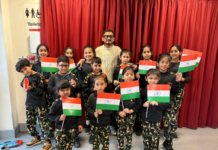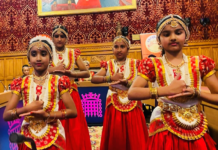Pitru Paksha: the holy lunar fortnight where we make offerings to our ancestors
Dhruv Chhatralia
During the holy lunar fortnight of Pitru Paksha, which begins on 5th September and ends on 19th September, we bow down and pay respect to our ancestors by offering them rice and water.
Many people ask whether they should give such oblations and offerings of rice and water to their ancestors. People ask “what if we do not spend money on this and give that money as a donation?” or “we believe in it but our children do not believe in it so what will happen if our children do not give us offerings of rice and water when we die?” These are very sentimental questions and these thoughts are coming again and again; that is why people are asking these questions.

Let us understand one thing very clearly. The meaning of an oblation or shrādha is:
shradhayā yatkriyate tat shrābdham
That which is done with faith is an oblation
WHY SHOULD WE GIVE OBLATIONS TO OUR ANCESTORS?
Whatever we are, it is because of our ancestors. Whatever we have, be it success, possessions, fame etc, it is because of our ancestors’ blessings and compassion. The bottom line is the very fact that if it was not for our ancestors then it would not have been for us. One person asked Guruji “why should I do all these offerings for my father. My father has done nothing for me and has left nothing for me?” Guruji told him “Oh clever man, is it not enough that your dad left you in this world? What would happen if you were not here?” Should you only give offerings to your parents when they leave you something? It is a sense of gratitude that “whatever I am, it is because of my ancestors. Therefore I should make my ancestors happy. Have I done anything to make my ancestors happy?”.
HAVE WE DONE ANYTHING TO MAKE OUR ANCESTORS HAPPY?
Each of our ancestors has this wish that whoever comes in their lineage is happy and divine so that they can go further in life. Their way of saying this may be different and there may be a disagreement between a parent and a child, but look at the reasons why they are saying what they are saying. A parent will never wish from their hearts that their son or daughter be unhappy. Never. It is always in their hearts that whichever child comes in their lineage, family is always happy and can go further in life. Because of this very wish of our ancestors, we come forward in life. Ask yourself whether you have done anything to give their souls peace. Wherever our ancestors are, their souls receive messages. It has been proved beyond doubt in the field of parapyschology that they know all of our thoughts. We know our relatives from all our births. Wherever our ancestors are and whatever they are doing, vibrations are coming to us from them and our moods are changing because of this.
RESEARCH IN PARAPSYCHOLOGY: WHY DO CHILDREN LAUGH FOR NO REASON?
Research on this started from a very small thing that people noticed. When a four to six month old child is sleeping in someone’s lap on in a cot, its eyes may be closed but from its lips it looks like it is smiling or laughing. Why is this child laughing? It does not understand any languages, nobody has told it a joke and nobody has tickled it then how could it laugh? In simple language, we can say that the child is talking with God. But that thought cannot held in a scientific debate. Research was done on this behaviour in the field of parapsychology and it was proved that vibrations and messages were received by the child from its ancestors in the past five generations. Their ancestors in the previous five generations are doing good deeds and things that the child likes, and because the child is so sensitive and with a clear conscious, it receives the vibration from their ancestor, likes it and shows this feeling through its lips. Then when it gets older, up the age of one the child’s sensitivity is very sharp, but with age the world’s air falls upon the child and other things come in so dust falls on that child’s sensitivity.
Even we know that. Sometimes it suddenly feels nice when we get up even if nothing good has happened. You have not won the lottery, nobody has brought you feel good, but you still feel good. You feel elated. Why does it feel that way? We cannot come up with a reason but we just feel nice. This is because these vibrations are coming from somewhere and we have caught them. And sometimes it is the case that there is no reason but we still feel depressed and low. This is because something bad has happened somewhere to our relatives and somewhere our relatives are sad. We also receive these vibrations and waves.
THE SYMBOLISM BEHIND WATER
We are not trying to be ritualistic. Rituals have their meanings. If you try to understand the meaning of something like offering rice scientifically then it has a wonderful meaning. We should definitely do so because the important thing about rituals is that they are symbols. It is only through symbols that their meaning can be protected. You cannot sit down with someone and understand the meaning behind everything. But you can do so through symbols for example “they are my relatives and therefore I will offer them water”. That is what water is for. The quality of water is:
sheetas parshava tyāpaha
one libation gives them coolness.
The meaning of this is that I should do things with my karma that wherever our relatives are and in whatever form they get the vibrations. The pindh (rice offering) is for our relatives and we are summoning our relatives. Just like the idol represents God and we summon God through the idol, the pindh represents our relatives and we are summoning our relatives through the pindh and we are saying that “whatever expectations you had of us, have I met those expectations?” And remember that the giving of offerings to our ancestors benefit us more than it benefits our ancestors. We have a need for it and not our ancestors because we are going to develop through it. We are asking how much we have developed in line with their expectations.
THE TIME TO DO SELF-ANALYSIS
Every year, this is the time to do self-analysis where you ask yourself how much you have done and how much you have advanced when compared with what your ancestors expected of you. When you have gone forward in life then you will be able to make offerings to your ancestors with pride. You will be able to tell your ancestors “father I have done this, grandfather I have done this”. It is a rule that you have to remember all of your ancestors because there are so many people that have constructively made a contribution to your life. That is why when we pray, we remember our mother, father, aunt, uncle, grandparents, all of them because all of them have contributed to our lives. Then should we not be grateful towards them? Such a ritual is there all over the world, for example All Saints Day in Europe on 2 November where they remember their relatives. This is why we make offerings to our relatives.
THE MEANING BEHIND RITUALS
When these offerings are done, for example the pindh offering then the full meaning will remain. Because when the symbols are removed then the thoughts will go as well. Because after performing symbolic rituals for 10, 20, 30 years the performer will ask “why am I doing this?” Then the performer will have the wish to find out, research and discover the meaning behind the symbol. But what if one is not doing this ritual? He will never have to wish to self-reflect, the thought will just go and the concept will be rooted out. That is why I say do the rituals. Offerings should be made to the ancestors.
THE SYMBOLISM BEHIND RICE
Pindhdān also has another meaning. Pindh is of course the pindh made from rice but it is also an offering. A person who offers pindh has a word for him or her in Sanskrit: je pindhe e brāhmānde. Our descendants may make offerings of rice for us but have you made an offering of pindh for yourself. Have you made an offering to the God inside yourself? Have you made use of the God inside yourself for holy acts? Have you used it for good acts? Only then do you get liberation or salvation. The person that has never used the God inside themselves for good deeds can never achieve liberation.
If a person has done nothing and the person’s descendants give lots of offerings for that person, then offeror will definitely benefit from this self-analysis but, I will clear this misunderstanding right now, the amount of salvation a person gets depends entirely on their karmas. The offerings we make to ancestors are for our development and for our good. I have seen many cases in front of my eyes where a son has done nothing for his father when the father is alive but starts crying a lot while offering rice to his father once the father dies. The son’s sentiments towards his father completely change. At those times I feel that our saints may have made this ritual for this purpose.
THE FOUR TYPES OF CHILDREN
A son can fall into four categories: a dipro, dikro, putra and santān. First of all the dipro. The parents wonder why this child came into the world as they had peace before he came in. He causes problems as soon as he comes into the world. The second, dikro will educate himself and look after the parents only when it benefits him. If they cause him any losses then he will not tolerate it. Thirdly, a putra will look after his parents and will incur costs in doing so but only because he will look bad in society if he does not do so. Such a son has no sympathy towards his parents and does it only because he is scared of what people will say. The fourth is santān. Samyak tonoti iti santān. Whatever good deeds the parents have done, one who continues those good deeds and advances them after his parents go is called santān. A santān could be a son or a daughter. It could be anyone. But for a santān to be do these good deeds, the parents must also have done these good deeds in their lives. Only then can the son or daughter advance them. What can the son or daughter do if the parents have not started these good deeds. If a parent spends all their time buying worthless goods in the market then their child will spend the entire day sitting on those worthless objects. They have not done anything apart from that. If a person spends their life measuring goods in the marketplace then the child will spend all their life measuring goods in the marketplace. Has the parent done anything in their lives that will give their child inspiration to go forward in life and to do similar such things? This is what the offerings are for.
May the good vibrations of your Satkarma (Divine Acts) reach your ancestors wherever they are and may we work together the preserve the holy traditions that our ancestors protected for thousands of years.
With prayers and blessings,
SATKARMA HUMANITARIAN YOUTH AWAKENING MISSION (SHYAM)

Readers like you, make ESHADOOT work possible. We need your support to deliver quality and positive news about India and Indian diaspora - and to keep it open for everyone. Your support is essential to continue our efforts. Every contribution, however big or small, is so valuable for our future.











